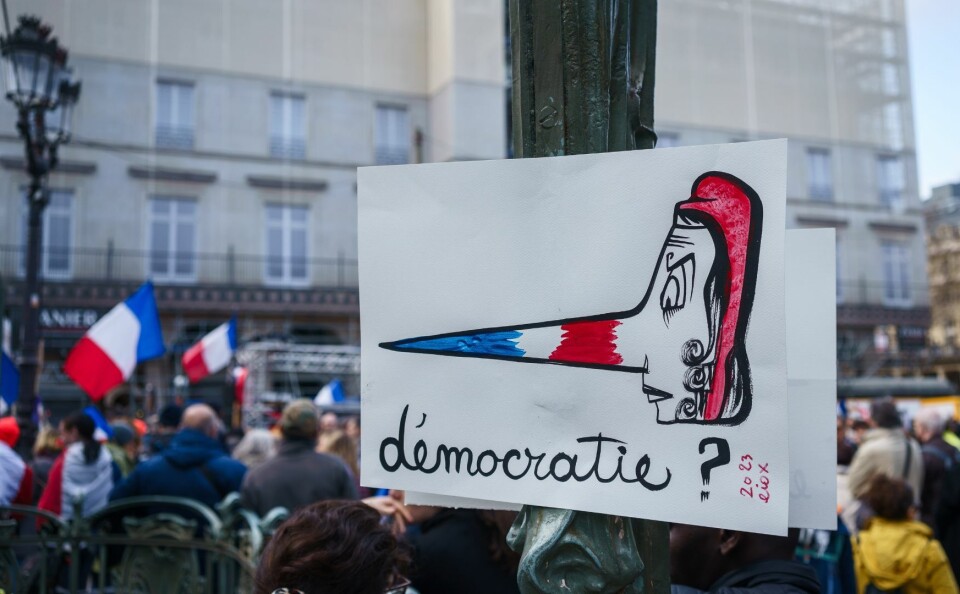-
We went to a French curry house but it didn't hit the spot
Columnist Samantha David laments the lack of decent meals in the style of the subcontinent
-
From 'romantic Paris' to dating apps: love is changing in France
Researcher Aziliz Kondracki explains the role that romance plays in modern France
-
My tips for bird nesting season in south-west France
Some species begin building nests as early as February, including collared doves, mistle thrushes and song thrushes
Do you agree? Protests and polls undermine real democracy in France
There are two parallel democracies in France - the ballot box vote and the protest in the street, says journalist Nick Inman

It was the word ‘unpopular’ that piqued my curiosity.
The Guardian’s Paris correspondent claimed that President Macron’s pension reforms were unpopular because, well, just look at the number of protesters out on the streets on strike days.
That proves it, doesn’t it?
Democracy is, of course, government by popularity and this raises the interesting question: how is this mysterious force of public acclaim measured?
Read more: Updated: Dates and sectors of upcoming pension strikes in France
Macron’s election platform included pension reform
For the last few months, there has been a consensus in the media – French and international – that Macron and his prime minister Elisabeth Borne are at fault on this issue: they are stubborn, arrogant and on the wrong side of democracy.
They are not listening to what their electorate is telling them.
Hang on a minute. A recently re-elected president who is unpopular, undemocratic and working against the people? We should not let this assertion pass without checking it.
Macron was voted president last year on a platform that included pension reform.
The legislative elections delivered a hung parliament but still the president could claim he had a responsibility to the people to do what he had promised and what they had asked him.
Have the people since changed their minds?
What if they realise they have made a mistake?
What if they change their minds from week to week?
What if they are obsessed with a single issue and do not see how it relates to everything else that government is about?
To put it crudely: one person’s public spending rise is another’s tax increase.
Read more: France’s pension reforms ‘not enough’ to help social security deficit
Spontaneous democracy measured by the size of the mob
Reading the media lately, you get the impression that there are two parallel democracies in France: the formal democracy of the past that should be ignored, and the spontaneous democracy of the present that must be respected, whatever it says and however it says it.
This day-to-day democracy is measured not by votes cast in secret ballots but by the size and noise of the mob and by the results of opinion polls (which are anything but scientific).
‘Direct democracy’ – a vague euphemism if ever there was one – is justifiable if a politician goes back on a promise or expects citizens to fight a war that breaks international law.
Opposition politicians and journalists use the protests
In other circumstances, it is a dubious good that serves the interests of opportunist, populist leaders. They have nothing to lose and everything to win by demonising the incumbent president.
Opposition politicians cannot hide their delight in the wave of dissatisfaction that they hope will carry them into power.
Journalists, too, like it when politics is transferred to the streets.
Dry parliamentary discussions about the technicalities of legislation do not make good television. Footage of clashes between protesters and police keep viewers hooked to their screens and social media surfers clicking.
Some of the losers in last year’s presidential election are calling for a Sixth Republic which, they hope, will prevent autocratic presidential rule in the future.
Democracy means being honest about the trade-offs
This, they say, is the answer to the problem. They have not understood the first rule of democracy: it is about talking as much as voting.
It is good that people take an interest in politics, participate and make their feelings known, but it must not be at the expense of dialogue.
Democracy is not simply what happens in the ballot box or what opinion polls report.
It is how a free and fair society talks to itself.
It is debate: speaking and listening, exchanging information, and being honest about trade-offs that have to be made.
Dialogue needed about difficult choices
We are undoubtedly seeing the two main shortcomings of representative democracy: negative voting (against Le Pen but not necessarily for Macron) and the fact that you have to vote for a package of pledges, some of which you might not agree with at all.
The way to sort this out is not to create new institutions but to discuss the problem with respect for one’s opponents.
When dialogue about difficult choices is replaced with a zero-sum game of pronouncements by Macron met by slogans from angry strikers, France is no longer demonstrating to the world how democracy is done.
Related articles
‘Forget raising retirement age in France, AI will lead to job losses’
‘Bringing back monarchy to France may not be a ridiculous idea’
























